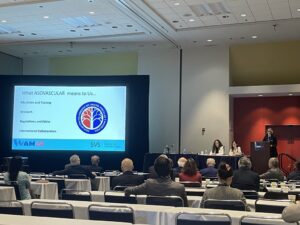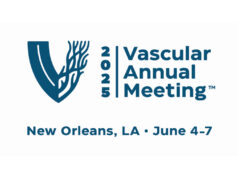
The International Chapter Forum Educational Session at VAM 2024 saw Ana M. Botero, MD, chief of vascular surgery at Fundación Santa Fe de Bogotá in Bogotá, Colombia, speak on the evolution of the SVS Colombian Chapter.
“We’re people that do lots of work, but we’re not in the game yet,” Botero began, in a section of her talk outlining “the Colombian problem.” The presenter continued: “We don’t know how to value ourselves, so being here [at VAM] brings us a lot of connections and that’s something that I’m pretty grateful for.”
In addition to networking opportunities, the presenter underscored the importance of the SVS on the world stage, highlighting its synonymity with education, publications, journals, conferences, online courses, research and support.
The focus of Botero’s talk then moved from problem to opportunity. “There [are] many surgeons that paved the way,” she said. “Seeing somebody that looks like you, talks like you, and is an amazing surgeon outside of Colombia is very important.”
Botero noted that the Chilean Chapter played a significant role in laying the foundations for the Colombian Chapter. She recalled thinking: “Chileans got into the SVS as the Chilean Chapter, so the idea came right away—why not Colombia?”
Botero shared that, around six years ago, “people started sending emails, asking questions” about how to get people from Colombia into the SVS, which she noted resulted in a “very beautiful” collaboration with the society.
In terms of what to expect from this sort of collaboration, Botero urged members “don’t be shy” and to ask questions.
“SVS is a huge platform, so take it. And for LATAM [Latin America], everything is possible, so let’s do it, let’s take this,” she continued.
In the discussion following Botero’s presentation, one audience member asked how to approach the challenge of ensuring members enjoy the full benefits of SVS membership.
“I think that we’ve got to get the word out,” Botero responded. “People are scared of being here, in these sorts of spaces. The language barrier is something that is pretty important for us, but I think that once you get here and you get to talk and you get to see people who look like you, talk like you and are able to be here without any reservations, well then you get the courage to do it.”












